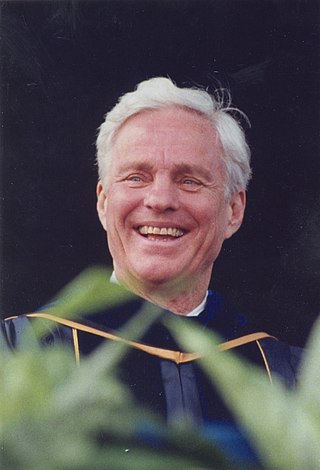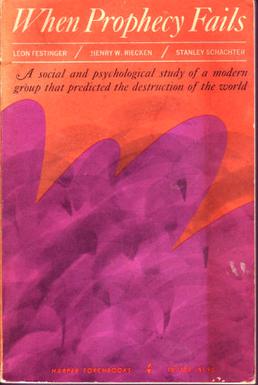
In religion, a prophecy is a message that has been communicated to a person by a supernatural entity. Prophecies are a feature of many cultures and belief systems and usually contain divine will or law, or preternatural knowledge, for example of future events. They can be revealed to the prophet in various ways depending on the religion and the story, such as visions, divination, or direct interaction with divine beings in physical form. Stories of prophetic deeds sometimes receive considerable attention and some have been known to survive for centuries through oral tradition or as religious texts.
A self-fulfilling prophecy is a prediction that comes true at least in part as a result of a person's belief or expectation that said prediction would come true. This suggests that people's beliefs influence their actions. The principle behind this phenomenon is that people create consequences regarding people or events, based on previous knowledge of the subject.

Wishful thinking is the formation of beliefs based on what might be pleasing to imagine, rather than on evidence, rationality, or reality. It is a product of resolving conflicts between belief and desire.
The Pygmalion effect, or Rosenthal effect, is a psychological phenomenon in which high expectations lead to improved performance in a given area and low expectations lead to worse. The effect is named for the Greek myth of Pygmalion, the sculptor who fell so much in love with the perfectly beautiful statue he created that the statue came to life. The psychologists Robert Rosenthal and Lenore Jacobson, in their book Pygmalion in the Classroom, borrowed something of the myth by advancing the idea that teachers' expectations of their students affect the students' performance, a view that has been called into question as a result of later research findings.
Expectancy theory proposes that an individual will behave or act in a certain way because they are motivated to select a specific behavior over others due to what they expect the result of that selected behavior will be. In essence, the motivation of the behavior selection is determined by the desirability of the outcome. However, at the core of the theory is the cognitive process of how an individual processes the different motivational elements. This is done before making the ultimate choice. The outcome is not the sole determining factor in making the decision of how to behave.
Kenneth Bancroft Clark and Mamie Phipps Clark were American psychologists who as a married team conducted research among children and were active in the Civil Rights Movement. They founded the Northside Center for Child Development in Harlem and the organization Harlem Youth Opportunities Unlimited (HARYOU). Kenneth Clark was also an educator and professor at City College of New York, and first Black president of the American Psychological Association.

Richard Chatham Atkinson is an American professor of psychology and cognitive science and an academic administrator. He is president emeritus of the University of California system, former chancellor of the University of California, San Diego, and former director of the National Science Foundation.
A doomsday cult is a cult that believes in apocalypticism and millenarianism, including both those that predict disaster and those that attempt to destroy the entire universe. Sociologist John Lofland coined the term doomsday cult in his 1966 study of a group of members of the Unification Church of the United States: Doomsday Cult: A Study of Conversion, Proselytization, and Maintenance of Faith. In 1958, Leon Festinger published a study of a group with cataclysmic predictions: When Prophecy Fails: A Social and Psychological Study of a Modern Group that Predicted the Destruction of the World.
Pygmalion in the Classroom is a 1968 book by Robert Rosenthal and Lenore Jacobson about the effects of teacher expectation on first and second grade student performance. The idea conveyed in the book is that if teachers' expectations about student ability are manipulated early, those expectations will carry over to affect teacher behavior, which in turn will influence how the students will perform on an IQ test. Inducing high expectations in teachers will lead to high levels of IQ test performance. Inducing low expectations, will lead to low IQ test performance.
Robert Rosenthal is a German-born American psychologist who is a Distinguished Professor of Psychology at the University of California, Riverside. His interests include self-fulfilling prophecies, which he explored in a well-known study of the Pygmalion effect: the effect of teachers' expectations on students.
Francine Shapiro was an American psychologist and educator who originated and developed eye movement desensitization and reprocessing (EMDR), a form of psychotherapy for resolving the symptoms of traumatic and other disturbing life experiences.
Jerome Kagan was an American psychologist, who was the Daniel and Amy Starch Research Professor of Psychology at Harvard University, as well as, co-faculty at the New England Complex Systems Institute. He was one of the key pioneers of developmental psychology.

Robert Epstein is an American psychologist, professor, author, and journalist. He was awarded a Ph.D. in psychology by Harvard University in 1981, was editor in chief of Psychology Today, and has held positions at several universities including Boston University, University of California, San Diego, and Harvard University. He is also the founder and director emeritus of the Cambridge Center for Behavioral Studies in Concord, MA. In 2012, he founded the American Institute for Behavioral Research and Technology (AIBRT), a nonprofit organization that conducts research to promote the well-being and functioning of people worldwide.

When Prophecy Fails: A Social and Psychological Study of a Modern Group That Predicted the Destruction of the World is a classic work of social psychology by Leon Festinger, Henry Riecken, and Stanley Schachter, published in 1956, detailing a study of a small UFO religion in Chicago called the Seekers that believed in an imminent apocalypse. The authors took a particular interest in the members' coping mechanisms after the event did not occur, focusing on the cognitive dissonance between the members' beliefs and actual events, and the psychological consequences of these disconfirmed expectations. One of the first published cases of dissonance was reported in this book.
Reflected appraisal is a term used in psychology to describe a person's perception of how others see and evaluate him or her. The reflected appraisal process concludes that people come to think of themselves in the way they believe others think of them. This process has been deemed important to the development of a person's self-esteem, especially because it includes interaction with people outside oneself, and is considered one of the main influences on the development of self-concept.

Getting It: The Psychology of est, a non-fiction book by American clinical psychologist Sheridan Fenwick first published in 1976, analyzes Werner Erhard's Erhard Seminars Training or est. Fenwick based the book on her own experience of attending a four-day session of the est training, an intensive 60-hour personal-development course in the self-help genre. Large groups of up to 250 people took the est training at one time.
The Golem effect is a psychological phenomenon in which lower expectations placed upon individuals either by supervisors or the individual themselves lead to poorer performance by the individual. This effect is mostly seen and studied in educational and organizational environments. It is a form of self-fulfilling prophecy.

Ayelet Gneezy is an associate professor of marketing at the Rady School of Management, UC San Diego.
Reiko Homma True is an internationally known Japanese American psychologist. True is Professor Emeritus of Psychology at Alliant International University in San Francisco, CA. She is recognized for her efforts to advance mental health services for Asian Americans and other minorities. She conducts research studies examining mental attitudes and status among minorities in the community, and publishes her research in reputable psychological journals.

Nalini Ambady was an Indian-American social psychologist and a leading expert on nonverbal behavior and interpersonal perception. She was born in Calcutta, India and earned her bachelor’s degree at Lady Shri Ram College for women, Delhi University. She furthered her education by moving to the United States for her master’s degree in psychology, from the College of William and Mary, and later received her PhD in social psychology from Harvard. While completing her research at Harvard, she met her husband Raj Marphatia, who was studying at Harvard Law school.







